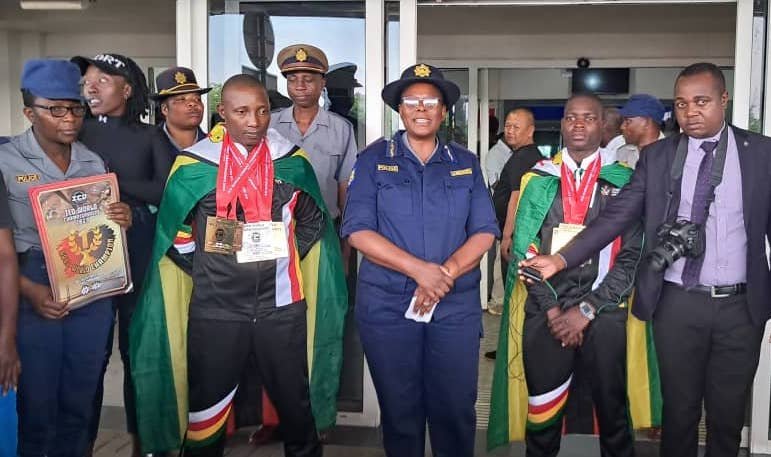News
The Struggles of Zimbabwean Care Workers in the UK: A Migration of Necessity COS (Certificate of Sponsorship)
The challenges faced by Zimbabwean Care Workers especially those on COS (Certificate of Sponsorship) include scarcity of shifts.

In recent years, the United Kingdom has witnessed a significant influx of people migrating from Zimbabwe in pursuit of greener pastures. The vibrant greenery of the UK is a stark contrast to the economic and political challenges faced by many in Zimbabwe. However, this mass exodus, primarily driven by a dire need for survival, comes with its own set of challenges.
The decision to leave one’s homeland and seek a life in a foreign country is not often taken lightly. For many Zimbabweans, migrating to the UK is not a matter of choice but rather a necessity. The economic hardships, political instability, and scarcity of opportunities back home have created an environment where many professionals in the healthcare sector and other varied sectors are left with little choice. Leaving their families and loved ones behind, they embark on a journey in search of a more stable and prosperous life.
Some might describe this exodus as a “brain drain on steroids.” Zimbabwe is losing a significant portion of its skilled workforce to other countries, creating a void in the healthcare sector. The absence of medical professionals back home further strains an already struggling healthcare system. Yet, the lure of better opportunities abroad is too strong for many to resist.
The challenges faced by Zimbabwean Care Workers especially those on COS (Certificate of Sponsorship) include scarcity of shifts. This is one of the most pressing challenges as many sponsors are struggling to secure enough work for their employees resulting in workers unable to secure consistent employment, leading to financial instability and uncertainty. When one is lucky to find the shifts, issues of delayed payments can further exacerbate the financial stress, disrupting budget planning and leading to unpaid bills.
Reports of sexual harassment are concerning, as some care workers find themselves in vulnerable positions without adequate protection. Individuals in positions of power are found to be sexually harassing their employees, this not only affects their mental well-being but also raises questions about their safety. Joining women’s groups and airing these issues is vital while engaging professionals is highly recommended, but it might be expensive as it usually is a paid service.
Homelessness is becoming far too common with sponsored support workers, the high cost of living in the UK often leads to precarious living situations. Some care workers are left homeless, sleeping rough on the streets, which is both physically and mentally distressing.
Unfamiliarity with social challenges makes adapting to a new country and its culture, this is never easy. Zimbabwean care workers often encounter unfamiliar social norms, leading to feelings of isolation and disorientation. The cumulative effect of these challenges takes a toll on mental health.
In a foreign land where they may lack support systems, depression, anxiety, and feelings of hopelessness become all too common. Regrettably, the struggle to adapt to their new lives in the UK has led to reports of individuals taking their own lives, particularly among men who may find it difficult to express their emotional distress.
Moreover, overworking to make ends meet is a common occurrence, leaving care workers fatigued and susceptible to both physical and mental health issues. The pressures they face in trying to secure financial stability can be overwhelming.
Given the circumstances at hand, it’s crucial for anyone considering a visa application through COS (Certificate of Sponsorship) to be well-informed and thoroughly prepared. If things take an unexpected turn, it’s wise to have a financial safety net that can sustain you for at least two months.
Before embarking on this journey, it’s imperative to conduct your due diligence. Take the time to delve into the specifics of your sponsor’s situation. Ask pertinent questions about factors like the availability of shifts, shift patterns, hourly rates, payment procedures, accommodation arrangements, transportation, and even access to food.
These inquiries are more than just a formality; they are your armour against unexpected challenges, especially if you lack a support network of friends or relatives to assist you should you encounter difficulties. The United Kingdom undoubtedly offers remarkable opportunities, but the road to success is rarely as smooth as one might imagine.
While it’s perfectly fine to harbour high expectations, it’s crucial to acknowledge that circumstances can change rapidly. Therefore, being well-prepared and well-informed is your best defence against the unforeseen obstacles that may arise on your journey toward realizing your dreams in the UK.
Ask pertinent questions and prepare!
News
Toxicity on X Platform, Zimbos Virtual Fights
In reality, the toxicity on X has left scars that can be hard to heal.

In the age of social media, where platforms like X (formerly known as Twitter) connect people across the globe, Zimbabweans have found a unique virtual battleground to settle their scores. The keyboard has become their weapon of choice, and in this digital arena, they grab, grapple, type insults, and proudly showcase their political pedigree to win a following.
This online space has become the breeding ground for controversial influencers, with figures like Sadhaya feeling right at home. Here, toxicity is not just prevalent; it’s rewarded with popularity. Followers have become martyrs for their chosen leaders, ready to pounce at the slightest provocation. Self-made politicians and impassive individuals strut these cyber streets like kings and queens, vying for the virtual throne. Noone is safe on X streets, even Elon Musk himself is always under attack from free account subscribers.
In this virtual environment, everything related to politics happens here. Political campaigns, voting, results tabulations, and even the announcement of election results are conducted within the confines of this digital space. Elon Musk’s entry into this domain added a new twist, as he began offering incentives to creators. The coveted “blue tick” gang emerged, with the criteria to be eligible for payouts being an X Premium (Blue) subscriber, receiving at least 15 million total impressions on your posts in the last three months, having a minimum of 500 followers, and being at least 18 years old. While this brought a new level of excitement, it also exacerbated the existing toxicity.
Content creators, enticed by the prospect of revenue, flooded the platform. It’s worth noting that toxic posts often garner massive followings, setting the stage for a race to reach that coveted 15 million impressions. X, in essence, became a fierce arena for digital competition, where a good sport could rise to become a person of great influence, positively or otherwise. Money was the undeniable motivator.
Within the diverse X platform, there are spaces dedicated to discussing various subjects. The impact of these spaces, however, varies depending on the topic at hand. Zimbabweans, it seems, are still stuck in election mode. The buzz on the platform revolves around themes like Shabangu and sanctions, reflecting the nation’s ongoing political turmoil.
In an ideal world, Zimbabweans would love each other virtually, transcending the boundaries of this digital battleground. In reality, the toxicity on X has left scars that can be hard to heal. But let’s not forget that the people behind the tweets are not devils; they’re products of their digital environment. Perhaps, if they were to meet in person, they might share a meal and laugh off the Twitter-induced wounds. The virtual world can be a reflection of our collective consciousness, and for Zimbabweans, X mirrors both their struggles and their hopes for a better future.
News
World Champions Mashaya & Fambira Receive Heroes Welcome
Master Mashaya and his dedicated student, Sempai Fambira’s outstanding victory in England has firmly established Zimbabwe on the global map of Martial Arts.

The First African Kobudo Team to be crowned World Champions in Weaponry Martial Arts arrived safely back in their home country yesterday. The Zimbabwe Kobudo team, led by Master Wilfred Mashaya and his dedicated student Vincent Fambira, received a warm welcome from their fellow countrymen. A multitude of people gathered at the RGM International Airport to honor the two Zimbabwean heroes who had not only raised their nation’s flag high on the global stage but also garnered a total of 11 medals, comprising 8 gold, 2 silver, and 1 bronze. Affiliated with the Zimbabwe Karate Union (ZKU), the Zimbabwe Martial Arts Kobudo Team’s triumph has brought immense pride to the nation.
The notable figures present at the airport to greet the World Champions included the esteemed Zimbabwe Republic Police Command, led by Commissioner Priscilla Makotose, along with Assistant Commissioner Ali Simbarashe Hondo, Assistant Commissioner Paul Nyathi, Chief Superintendent Laxon Sibanda, Superintendent Abel Chimukoko, Superintendent Shamiso Jaricha, and other ZRP commanders and members. Commissioner Priscilla Makotose, representing the Commissioner General of Police Cde Tandabantu Godwin Matanga, had been delegated to extend a special welcome to the two Zimbabwean World Champions.
The welcoming crowd also consisted of members of the Zimbabwe Karate Union, various martial artists from different organizations, bodybuilders, sports enthusiasts from diverse disciplines, members of the Zim Ninja Academy, media personnel, members of the ZRP, as well as family, friends, and relatives. Notably, Master Mashaya’s mother had journeyed all the way from the rural areas, traveling nearly 400 km from Gokwe, to greet her victorious son. Overwhelmed with pride, she was moved to tears at her son’s remarkable achievements. The depth of a mother’s love was poignantly evident in her dedicated efforts to be there for her son.
The younger generation, inspired by Master Mashaya’s remarkable journey, also joined in the welcome. Many of the children present at the airport viewed the Zim Ninja as their role model, with aspirations to follow in his footsteps within the realm of martial arts. Various performances and displays were organized by different groups at the airport to celebrate and honor the two World Champions, creating an atmosphere filled with joy and elation.
Master Mashaya and his dedicated student, Sempai Fambira’s outstanding victory in England has firmly established Zimbabwe on the global map of Martial Arts. Their impressive performances have garnered admiration from various countries worldwide, with accolades pouring in, particularly on social media platforms.
The ICO World Martial Arts Championships, which took place from October 20 to October 22, were hosted at the Allam Sports Centre, situated at the University of Hull in Hull City, England. The event was organized under the leadership of Mr. Andrew Hennessy, representing the International Combat Organisation based in England. More than 15 countries and over 500 athletes participated in the championship, including teams from England, Wales, Ukraine, Germany, France, Lebanon, Hungary, Ireland, Scotland, Cyprus, Isle of Man, Portugal, Spain, and Brazil, among others.
Master Mashaya’s individual excellence shone through as he claimed 3 Gold Medals and one Silver Medal in the Black Belts Individual Weaponry Categories. His student, Fambira, emulated his Master’s success by securing 3 Gold Medals and one Silver Medal in the 17 Years Individual Weaponry Categories. As a team, they achieved further glory, taking home 2 Gold Medals and one Bronze Medal in the Team Weaponry Categories. Master Mashaya expressed his elation at Fambira’s performance, viewing it as a testament to the growth of Kobudo Martial Arts, a discipline he introduced to Zimbabwe in 2016 after his triumphant endeavours in Russia. The categories they excelled in featured weapons like Katana Swords, Chuckle Sticks/Nunchaku, Tonfa, Kama, Sai, and Bo, among others. Their proficiency in these areas made them stand out, with very few individuals in Africa possessing such expertise.
The resounding success of the Mashaya-Fambira duo has ignited a sense of national pride. They pledged to continue their remarkable journey, promising to uphold the Zimbabwean flag on the world stage in Weaponry Martial Arts, provided they receive the necessary sponsorship. Their resounding message is that they attribute their success to unwavering faith in the Almighty Lord and to the values of hard work, humility, respect for others, commitment, focus, and above all, the discipline that propels one to scale new heights in the realm of sports.
News
A Lucrative Opportunity in Gold Mining, Zimbabwe’s Golden Future Within
As Zimbabwe steers towards a reliance on its extractive industry, gold emerges as the foremost foreign currency earner, closely followed by tobacco.

Zimbabwe’s rich and bountiful lands harbor not only a wealth of gold and diamonds but also a realm of untapped potential in the mining sector. Despite the inherent risks and the challenging nature of the industry, the allure of golden returns continues to draw in ambitious individuals seeking their fortune. Yet, the path to prosperity in Zimbabwe’s gold mining industry is not without its share of obstacles, from political turmoil to safety concerns, reflecting the urgent need for stringent regulations and safety protocols.
Artisanal miners in Zimbabwe echo a common sentiment, advocating a ‘just do it’ attitude when it comes to reaping the rewards of the gold rush. Their advice? A modest investment in equipment such as generators, picks, shovels, and compressors can pave the way for a potential windfall. Nevertheless, the perils of collapsing mining shafts claim the lives of many young aspirants, highlighting the critical necessity for comprehensive safety measures and proactive regulations in the mining landscape.
With an estimated 13 million tonnes of proven gold deposits lying beneath its surface, Zimbabwe stands poised at the brink of a golden era. Despite having tapped a mere 580 tonnes since 1980, the country’s potential remains largely untapped, offering an enticing prospect for those willing to seize the opportunity. As foreign investors join the race for Zimbabwean gold, the country’s mining towns bear witness to a renewed surge in activity, with the precious metal now serving as a vital hedge against the global financial risks stemming from the aftermath of the COVID-19 pandemic.
As Zimbabwe steers towards a reliance on its extractive industry, gold emerges as the foremost foreign currency earner, closely followed by tobacco. However, amidst the nation’s economic and political fluctuations, sustainable resource governance emerges as a pressing concern, demanding thoughtful policies to ensure equitable distribution of wealth among all strata of society.
In the depths of Zimbabwe’s gold mines lie stories of chance discoveries and long-lost treasures, such as ore-laden wagons abandoned during the Second World War. While tales of German explorers hastily fleeing during wartime linger, the veracity of these accounts remains to be substantiated by concrete evidence. The tales of underground skeletons and buried mines resonate as cautionary echoes of a tumultuous past, underscoring the need for comprehensive historical research to unearth the truth.
The appeal of immediate cash payments in US dollars has enticed numerous families to flock to Zimbabwe’s artisanal and small-scale gold mining industry, often leaving behind their ancestral homes in pursuit of a share of the lucrative pie. Unlike in many other nations, the Zimbabwean government has embraced this form of mining, allowing the masses to participate, provided they obtain the necessary licenses.
Witnessing a surge in construction activities, mining towns stand as testaments to the newfound prosperity proliferating through the industry. As the ranks of millionaires swell, the wealth predominantly stems from the pursuit of this precious metal. Gold, with its relatively low capital requirements, emerges as the top choice for many, overshadowing other capital and labor-intensive mineral prospects within Zimbabwe’s rich mineral portfolio.
In embracing its mining potential, Zimbabwe faces a pivotal moment, where the prudent management of resources and an unwavering commitment to safety and sustainability will shape the course of its golden destiny.











